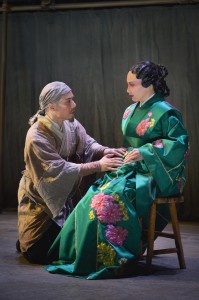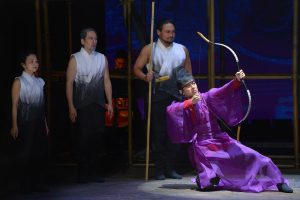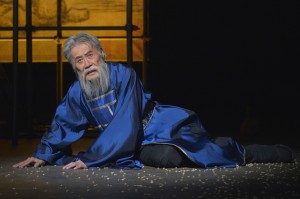A Wondrous Theatrical Event Harvested for La Jolla Playhouse
From ancient China, the Weimar Republic, England’s Royal Shakespeare Company and San Francisco’s American Conservatory Theatre (ACT) comes a splendid theatrical gift for the La Jolla Playhouse summer season, The Orphan of Zhao.
Rarely has such a juicy blend of virtuoso stagecraft, ethnic nuance, exotic flavors and ethical red meat been fashioned from such an unlikely source: a 13th Century Chinese play based on a historical account from 100 BC.
Great stories endure. And this one is terrific.

BD Wong and Marie-France Arcilla in The Orphan of Zhao at the La Jolla Playhouse. Kevin Berne Photos
A corrupt general gets the ear of the emperor and causes his chief rival to be convicted of treason and executed, along with his entire family except one, a newborn infant smuggled into hiding by a humble country doctor. The scheming general proclaims that, unless the orphan is produced, all male children born within the month, including the doctor’s own newborn son, will be slaughtered. Torn by duty to his country and his own blood, the anguished doctor chooses the former. His own child is destroyed but all the others, including the orphan, survive. In gratitude, the evil general adopts the doctor’s little family and raises the orphan, with all the advantages of the emperor’s court, to manhood. Then comes the time for revenge.
It’s a plot worthy of the Grimm Brothers but it’s as factual as any bit of 2,000-year-old recorded history around. And moral dilemmas never grow old.
The principal begetter of this treasure is Carey Perloff, who produced and directed it for ACT. She brought together the dynamic adaptation by English literary lion James Fenton, the marvelous score by Byron Au Yong, a game and dedicated cast headed by veteran Asian-American actors BD Wong and Sab Shimono and, above all the staging concept balanced somewhere between mystical chop-socky and blunt Bertolt Brecht.
Victims drop like zapped flies in this tale but the blood is only suggested and the violence is as stylized as the weapons. Fights (by Jonathan Rider) and the movement in general (Stephen Buescher) are solemnly choreographed.
Instead of Brechtian signage, characters introduce the scenes and update the story in speeches addressed directly to the audience, not so much soliloquies as just narrative assistance, presented in deliberate cadence that registers every word. The songs, some traditional and some by Fenton, are presented in park-and-bark fashion, uninterrupted by staging.
Yong’s insistent music seems to involve everybody sooner or later on drums, sticks, bowls, gongs and cymbals, assisting cellist Jessica Ivry, who plucks and saws away with passionate, non-stop eloquence, coaxing many non-cello sounds from her instrument. So integral is the music and the movement to the script that the show seems to flow like a lava field.
The 12 actors follow intricate complexities of identity-shifting with calm aplomb. Never does a scene seem to lack heft of numbers nor vocal depth.
As the country doctor, Wong stands out among the actors mainly because he chooses a sing-song delivery, usually heard by Western ears as “Chinese” but here, perhaps, an effort to suggest the agony of his decisions.
The other eight men and three women move through their vivid but stereotypical characters with dedicated ensemble dignity. Shimono makes an old courtier noble in his loyal suffering and Nick Gabriel does much the same for the doomed head of the Zhao Clan. Paolo Montalban depicts an emperor blighted with power and Stan Egi plays his Iagoesque advisor with a straightforward evil, which chills more than any posturing.
Daisuke Tsuji is as bright and stalwart as a hero should be, playing the orphan grown to maturity and ready for the truth. Orville Mendoza is a wise and patient old general and Philip Estrera is touching as the tortured ghost of the doctor’s slain son.
My favorite double is that of Brian Rivera, who plays “demon mastiff,” a powerful dog trained to kill, and later the general in charge of the gates, who discovers the infant orphan in the doctor’s pack and… talks baby talk to it. After allowing the escape, he must gut himself.
Women get short shift. Marie-France Arcilla’s best moment as the orphan’s mother come as a ghost, Cindy Im’s is a fruitless defense of the babe and Julyana Soelistyo plays the doctor’s wife with heart-rending passion, asking the question at the heart of the drama: Must she sacrifice her own child for her husband’s duty? It’s his child too, right?
The answer is yes, the mother accepts the substitute with a soft wail and nothing is heard or seen of her again. Some elements of this story see
m hopelessly alien…until further contemplation.
Throughout this wondrous production, Carey Perloff cast cultural nets than entangle us all. Memories of words and visions of scenes settle gently and don’t go away.
Daniel Ostling’s scenery is a tall scaffolding of bamboo that hides alcoves. Linda Cho’s costumes are subtle and suggestive tactile utility until the bright splash is needed. Lap Chi Chu’s dappled lighting design and the clever punctuation in Jake Rodriguez’ sound design all dovetail with a brilliantly produced and possibly unforgettable theatrical experience.

Julyana Soelistyo, Stan Egi, Orville Mendoza and Daisuke Tsuji, left to right, in The Orphan os Zhao at La Jolla Playhouse.
[box] ContInues at 7:30 p.m. Tuesdays and Wednesdays, 8 p.m. Thursdays-Saturdays, 2 p.m. Saturdays and Sundays and 7 p.m. Sundays through August 3, 2014.[/box]

Welton Jones has been following entertainment and the arts around for years, writing about them. Thirty-five of those years were spent at the UNION-TRIBUNE, the last decade was with SANDIEGO.COM.



